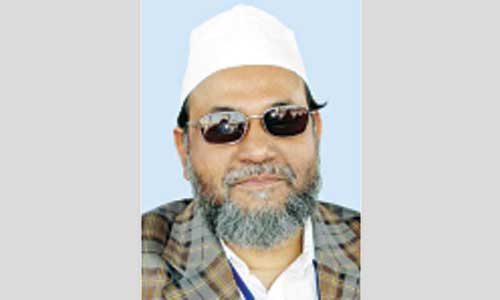Warrant issued for Quasem’s execution
The International Crimes Tribunal on Monday evening issued the warrant for the execution of war crimes death row inmate Mir Quasem Ali.
It issued the warrant within hours of receiving the full verdict of the Appellate Division upholding Mir Quasem’s death sentence.
The ICT-1 sent the death warrant and the full verdict of the apex court to the Dhaka Central Jail.
The death warrant was wrapped by a piece of red fabric inside a red cover.
The death warrant empowers the prison authorities to set in motion the process of Mir Quasem’s execution on expiry of 15 days, the stipulated period for him to file a petition seeking review of the apex court, said attorney general Mahbubey Alam.
On March 8, the Appellate Division delivered the summary verdict upholding the death sentence handed to Mir Quasem.
The ICT-2 gave the sentence finding Mir Quasem guilty of abducting and murdering teenage freedom fighter Jasim Uddin after torturing him in confinement in the port city of Chittagong during the Liberation War.
Mir Quasem was found guilty on six other war crimes charges that he committed as the ring leader of the notorious Al-Badr force.
In the observations , the apex court said that though Mir Quasem was charged only for abetting and facilitating Jasim’s murder, prosecution witnesses testified during the trial that he was directly involved with the murder.
‘If an offender in the capacity of superior commander directly participates in the commission of crimes against humanity, his culpability is higher than other offenders,’ said the verdict.
The apex court, however, acquitted him of the charges of abduction and torture of Jahangir Alam Chowdhury, Tuntu Sen and Ranjit Das Latu in confinement, looting and setting their houses on fire and later killing Ranjit and Tuntu in November 1971.
On November 2, 2014, Quasem was sentenced to death on the charge by a majority decision of the three-judge ICT-2.
The apex court said that in the majority opinion, the learned judges of the ICT-2 failed to notice’ that the prosecution witness, advocate Shafiul Alam, who was himself among the victims of abduction wrote the book ‘Dussapnar Narokey; Hotel Dalim.’
The apex court said that Shafiul Alam did not utter a single word about the detention of Rajit Das and Tuntu Sen.
The apex court also upheld 20 years’ jail term handed to Quasem on each of six other charges of abductions, confinements and torturing freedom fighters and pro independence people.
It acquitted him of two other similar charges for which Quasem was handed various jail terms by the trial court.
Citing a document presented by the attorney general the apex court verdict said that a lobbyist firm was paid $ 25 million
to influence the US government to get the war crimes trials in Bangladesh abandoned.
The apex court said that Mir Quasem’s business conglomerate was capable of spending $ 25 million to hire a lobbyist firm to foil war crimes trials in Bangladesh.
The verdict said that as the commander of his notorious killing squad Mir Quasem was among the most dreaded war offenders in Chittagong during the Liberation War.
The prosecution should have been more careful in handling this case, said the apex court.
It said that there was no coordination between two prosecutors who conducted the case at the trial stage.
The verdict said in the observations that prosecutor Sultan Mahmud examined 20 prosecution witnesses and prosecutor Zead-Al-Malum examined two other witnesses and there was no sequential coherence in the exercise.
News Courtesy: www.newagebd.net











